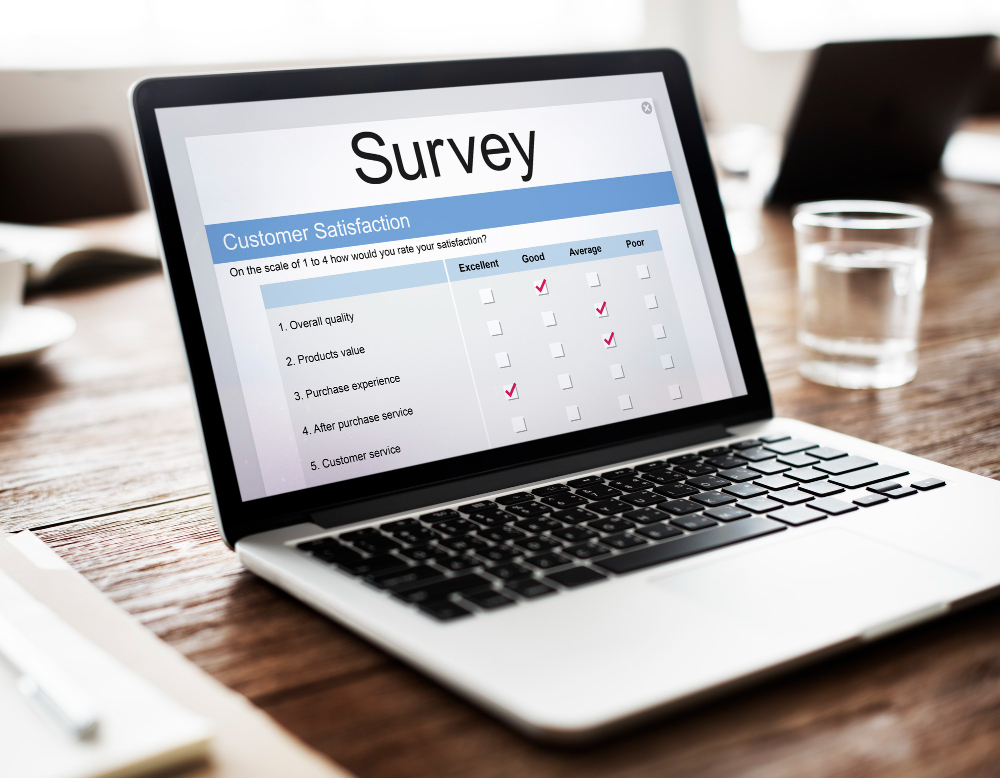Online surveys are a widely utilized data collection method in today’s technological world. Many researchers prefer this method to traditional surveys due to its low cost and high magnitude of reach.
Respondents also find online surveys convenient since they can fill them out within minutes and in the comfort of their couches. All one needs is a phone or computer and a stable internet connection.
Contents of Post
Understanding Online Surveys

An online survey also called an internet survey, is a data collection method where questions get shared and completed by respondents over the World Wide Web. These questionnaires get sent out to respondents via mediums such as email and social media.
They can also be shared through an embedded link on the researcher’s website. Online surveys serve the same purpose as traditional surveys – to collect information. The only two differences are the medium of delivery and the method of response. Respondents don’t need a pen and paper to complete an online survey.
Characteristics of Online Surveys
Surveys may look different, but they have a few set qualities. Here are the characteristics of online surveys:
- Defined Aim or Purpose
Like any other survey, online surveys have a defined goal or aim. There needs to be an objective behind them. Having a clear purpose enables you, the researcher, to structure your questions in a way that allows you to achieve the desired results.
For example, if the purpose of the online survey is to enhance a product or service, the researcher should tailor the questions to get feedback and recommendations from the customer.
- Precisely Structured Questions
An online survey should have a good balance of close-ended and open-ended questions. The most widely used question structures are multiple-choice, matrix, Likert scale, and dichotomous questions.
The questions are usually designed with convenience in mind to ensure the respondent has an easy time completing them while giving the researcher the desired feedback.
- Defined Target Audience

Having the right target audience is vital to conducting an effective online survey. Not everyone can or should fill out an online survey. Most researchers get a particular subset of people to answer their questions to ensure they get the most accurate results.
Researchers can define their target audience according to demographics, age, gender, profession, and marital and employment statuses. Therefore, as a respondent, you want to check if you fall within the desired target audience before filling out a survey.
- Collection and Analysis of Feedback
Online surveys are better than traditional surveys since they allow real-time data collection and analysis. Unlike traditional surveys, researchers don’t have to analyze the feedback manually. They can get real-time chart and graph metrics using statistical or automation software.
Pros of Online Surveys for Respondents
Online surveys are not only advantageous for a researcher. Here are the benefits of filling out an online survey over a traditional one:
- Easy to Complete
As mentioned above, most researchers structure their surveys to ensure easy completion. This allows the respondent to complete the survey within minutes. In most cases, you won’t have to type anything.
Online surveys often come with multiple-choice questions and structured responses, whereby you only need to tap or click on an answer choice.
- An Opportunity to Earn
As a respondent, you can get paid for taking surveys online. Online surveys can be a fun and easy way to generate extra income. Many panel sites offer you money or gift cards to complete their surveys.
If you are considering taking surveys for money online, go for a legitimate survey site. Never pay to complete a survey, and don’t give confidential information other than basic personal information such as your name, age, and location.
- Convenience
Online surveys are easy to access and submit. Researchers often avail them via an embedded link, which the respondent can click and complete the survey. You can also take online surveys from anywhere, whether at home, the office or in a cab.
- Anonymity
Some researchers don’t need your personal information to fill in a survey. Those that need your information most likely want to gauge if you fall within the required target audience. The researcher or survey site should also maintain confidentiality, meaning they should not disclose your personal details to unauthorized parties.
The Bottom Line
Online surveys are a more efficient way of collecting information from respondents. They are cost-effective and easy for researchers to design while being accessible and convenient for a respondent.
Online surveys facilitate anonymity and confidentiality, especially if you select a legitimate survey provider or company.

